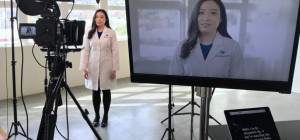If you are 20- something, kids aren’t exactly on your agenda and that’s totally natural. Why on earth would you care about diapers, pushchairs, and organic baby food while running late for your movie date? But in between your classes, Friday parties, and window shopping make sure you tick off at least three of the following fertility tips. Or you’ll hate yourself later for being too careless.

Ready?
- Make STD tests regularly
What can you do in 15 minutes? Aimless Facebook scrolling, hurried lunch break, or chit-chat with your girlfriends? It only takes a quarter of an hour (if not less) a year to get tested for sexually transmitted diseases such as chlamydia, trichomonas, HIV, gonorrhea, herpes, syphilis, and venereal warts. As they are often symptom free, you wouldn’t even know you have one. PAP-smear test and cervical screening are also must-do’s protect yourself from cancer.
Tip: always carry a few condoms in your bag for safe sex.
- Watch your fertility clock
Remember your age? Your years until you turn 35 are the most fertile ones (while only 2 in 5 women get pregnant by the age of 40). That’s exactly when your ability to have babies drops dramatically. This happens because with time there are fewer viable eggs left in your ovaries.
Tip: if you aren’t a faithful follower of a child-free lifestyle, consider family planning not later than 35.
- Avoid tap water
This one is going to be a bit icky so let’s quickly run through it. When we take pain killers, hormones, and other medicine they aren’t fully metabolized by our bodies. The remains travel outside through our urine right into our household sewage and further. The thing is, most cleaning facilities don’t see these recycled drugs as chemicals. Therefore, numerous lab tests show, if you drink tap unfiltered water you are likely to swallow some of your neighbor’s antidepressants.
Tip: got for bottled water instead or invest in a good water filter for your kitchen.
- Track your weight
When was the last time you stepped on your weight scales? Keeping track of your kilograms is vital for your ability to conceive because weight extremes (obesity or underweight) are linked to hormone imbalance. In severe cases, weight issues lead to abnormal or absent menstruating. If it happens to you, schedule an appointment with your doctor immediately.
Tip: exercising and healthy diet should be a part of your daily routine.
- Exercise moderately
Although physical activity such as working out, jogging or swimming, make you look fit and boost your immune system, there are certain limits. Make sure you don’t sweat your guts out exercising 5 hours a week or running like a horse on a treadmill as it may prevent an embryo from attaching to your uterus.
Tip: exercises without sweating should be your cup of tea
- Know your options
You aren’t a fortuneteller to know exactly what’s ahead of you (I doubt they know it either). Sometimes before a woman is ready to create a new human being, she faces obstacles such as chemotherapy or trauma that can damage her fertility in future. That’s when cryobanks come into play. What they do is they freeze your eggs so you can use them whenever you are ready.
If after 12 months of natural attempts to conceive (that’s exactly when your reproductive specialist is fully authorized to recommend you assisted reproduction) your belly is still flat, you may want to consider in-vitro fertilization or IVF. First, you take hormones to produce more viable eggs that are then retrieved by your doctor and fertilized in the lab by your partner’s sperm. Once done, the new embryos are then transferred to your uterus. IVF allows you to choose gender and number of your future kids.
Tip: if you are pressed for cash, talk with your insurance representative for advice.
- Take vitamins
It’s a no-brainer, right? But do you know exactly what vitamins to take to make your body perform at its peak? The answer is vitamin D. This vitamin can be found in your reproductive organs and is produced by uterus before and after the embryo appears to protect it from various infections. Vitamin D also plays an important role in women’s health when they are trying to conceive through IVF.
Tip: talk to your doctor about supplements and vitamin D in particular.
A post by Lada Endresen. She is a co-founder of International Medical Tourism Center, a free web-based clinic seeker overseas. Find the specialist you need based on your health, location, and budget in only 24 hours for free.







